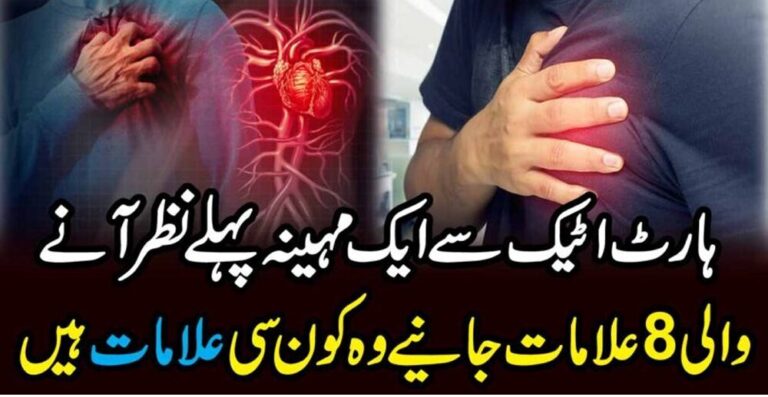Did you know your body often warns you weeks before a heart attack? The problem is, most people ignore those subtle signs until it’s too late. Heart disease is one of the leading causes of death worldwide, but early recognition of symptoms can literally save lives.
Let’s dive into the 8 symptoms that appear a month before a heart attack and why you should never ignore them.
What is a Heart Attack?
A heart attack, medically known as a myocardial infarction, happens when blood flow to part of the heart is blocked, usually by a blood clot. Without enough oxygen, heart muscles start to die, leading to permanent damage or even death if not treated quickly.
Why Symptoms Appear Before a Heart Attack
Your body is smarter than you think—it often gives warning signals before something serious happens. These early symptoms occur because your heart is struggling to pump efficiently, and other parts of your body feel the impact.
Symptom 1: Unusual Fatigue
If you’re constantly tired without a clear reason, it might be your heart talking. This kind of fatigue feels overwhelming, even after plenty of rest. It’s different from normal tiredness—it’s like your body is drained, and everyday tasks feel exhausting.
Symptom 2: Shortness of Breath
Do you feel like climbing stairs leaves you unusually breathless? Shortness of breath occurs when your heart can’t pump enough oxygen-rich blood. It’s an early red flag, especially if it happens during normal activities or even at rest.
Symptom 3: Chest Discomfort
Chest pain doesn’t always mean a sharp stabbing feeling. Sometimes, it’s pressure, tightness, burning, or heaviness in the chest. This discomfort may come and go, but it’s the most recognized warning sign of an upcoming heart attack.
Symptom 4: Dizziness and Lightheadedness
If you often feel faint, it could mean reduced blood flow to the brain. Dizziness paired with chest discomfort or breathlessness is a strong signal that your heart isn’t functioning properly.
Symptom 5: Cold Sweats
Breaking into a sweat when you’re not exercising or in a hot place is suspicious. Cold, clammy skin is often linked to stress hormones released when your heart is under strain.
Symptom 6: Pain in Other Parts of the Body
One of the trickiest signs is radiating pain. You might feel discomfort in your back, neck, jaw, shoulders, or even arms—usually the left one. This happens because nerves from the heart send signals to nearby areas, making the pain feel “spread out.”
Symptom 7: Sleep Disturbances
Struggling to sleep, waking up anxious, or tossing and turning can sometimes signal heart problems. Many people who later suffer a heart attack report restless nights in the weeks before.
Symptom 8: Swelling in Legs, Ankles, and Feet
If your shoes feel tighter or your legs look swollen, it could be due to fluid buildup from poor circulation. This is often a sign your heart is struggling to pump blood effectively.
Other Possible Warning Signs
Not everyone experiences textbook symptoms. Some people—especially women—report:
- Nausea or vomiting
- Indigestion or heartburn-like pain
- Unusual weakness
These “silent symptoms” can be just as dangerous.
Who is Most at Risk?
While anyone can have a heart attack, certain groups are at higher risk:
- People over 45 (men) and over 55 (women)
- Smokers and heavy drinkers
- People with diabetes, high blood pressure, or obesity
- Those with a family history of heart disease
How to Respond to Early Symptoms
Don’t ignore or self-diagnose. If you notice these symptoms regularly:
- Call your doctor immediately
- Monitor your blood pressure and sugar levels
- Adopt healthier habits (diet, exercise, stress management)
Prevention is Better Than Cure
Simple lifestyle changes can drastically cut your risk:
- Eat more fruits, vegetables, and lean proteins
- Quit smoking and limit alcohol
- Exercise at least 30 minutes a day
- Get regular heart check-ups
Conclusion
A heart attack rarely comes without warning. Fatigue, shortness of breath, chest discomfort, dizziness, cold sweats, body pain, poor sleep, and swelling in the legs are all signs you should take seriously. Listening to your body could be the difference between life and death.
FAQs
1. Can stress mimic heart attack symptoms?
Yes, stress and anxiety can cause chest tightness and sweating, but heart-related symptoms usually come with additional signs like breathlessness or radiating pain.
2. How do men and women experience symptoms differently?
Men often feel chest pain, while women may experience fatigue, nausea, and back or jaw pain more commonly.
3. Is chest pain always linked to heart problems?
Not always—it could be indigestion, muscle strain, or anxiety. But chest pain should never be ignored.
4. Can young people have heart attack warnings?
Yes. Although less common, poor lifestyle, obesity, and genetic factors can trigger heart issues in young adults too.
5. What should I do if I notice these symptoms?
Seek medical help immediately. Early diagnosis and treatment can prevent a heart attack.
Please don’t forget to leave a review.


